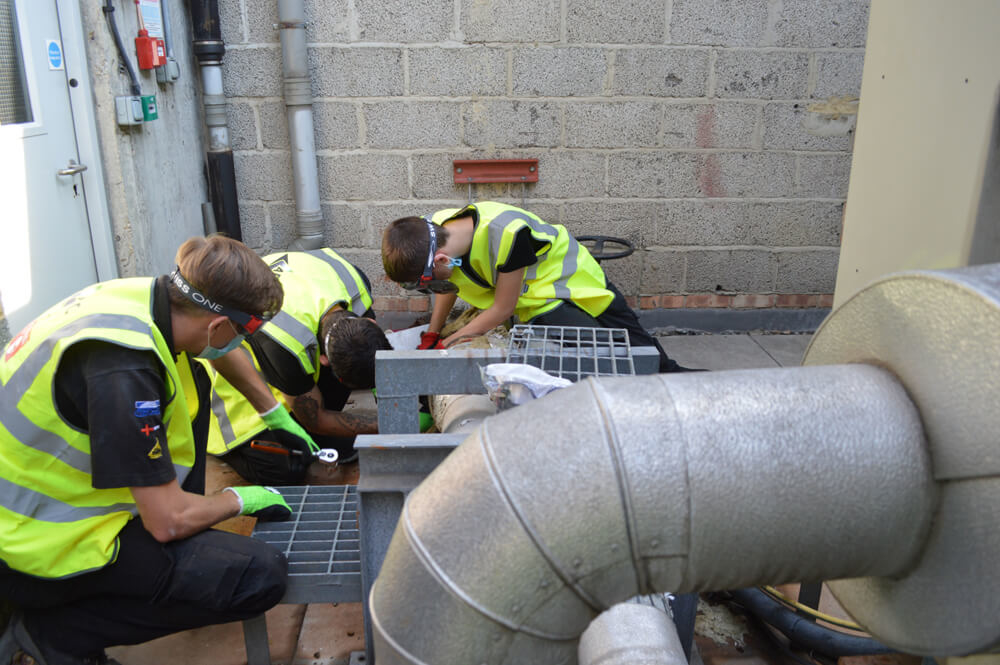
Teamwork and communication drive Artic’s success and have helped form our industry-leading reputation for providing exceptional maintenance support to sites of all sizes. Our engineers are experts in Hard Facilities Management, Energy Management, and HVAC installations, providing maintenance support that keeps our clients’ assets operational. We put a dedicated team of engineers on-hand who conduct planned preventative maintenance (PPM) and react to issues that occur on the site. Each team follows the instructions of the Site Manager, who uses intelligent software to help manage the site and direct the team.
KINGS COLLEGE HOSPITAL
We have a team of skilled engineers based at King’s College Hospital (KCH) in London, who are contracted to manage the facilities at the hospital and its complex network of outbuildings by providing planned and reactive maintenance support. At the heart of the team of engineers is the Site Manager, who controls all maintenance activity at KCH.
The Role Of The Site Manager
At KCH, the Artic team is led by a dedicated Site Manager who supervises a group of site-based engineers, including a Senior Engineer. Their role is to be the main point of contact for KCH and ensure all maintenance tasks at the hospital are completed by members of the team, ultimately being an extension of the KCH Estate Department and their needs.
Under the direction of the Site Manager, the team conduct planned preventative maintenance and reactive maintenance tasks assigned to them. The Site Manager leads the team and ensures that the engineers repair faults in the appropriate amount of time based on their urgency. To ensure the Site Manager’s expectations are met, the engineers must work as a team.
The Role of the Contract Manager
The Site Manager reports to the Contract Manager, who works closely with the client to nurture the commercial relationship and offer consultancy around site maintenance. The Contract Manager supports the Site Manager in overseeing PPM and reactive maintenance activities taking place at the site and handles the financial aspects of the relationship with the client.
How Teamwork Drives The Team’s Performance
No matter what Facilities Management discipline each engineer specialises in, our engineers are always willing to help other members of the team with equipment that they’re not familiar with and tasks that aren’t assigned to them. Teamwork allows the engineers to leverage each other’s knowledge and combine their efforts to complete jobs in less time. Having a team with varied expertise also ensures any issues that arise can be fixed the same day without an external engineer visiting the site.
How Technology Helps The Team
At Artic, we employ Tesseract’s Computer Aided Facility Management (CAFM) system to provide our engineers with intelligent software that enables them to deliver an improved service to our clients. It is frequently used by the Site Manager to review service reports, schedule upcoming work that needs to be completed at the hospital, prioritise callouts, view the team’s timesheets, and track booking times and job completion.
Using Tesseract CAFM software leads to increased visibility of the site, improved decision making, and enhanced management of the team. The Tesseract CAFM system allows the engineers to review past reports about call and site history at the hospital, as well as reports on specific assets they are working on, providing valuable information to the engineers to help them complete jobs. Tesseract is also used to predict upcoming maintenance tasks by identifying facilities that will soon need to be serviced and to schedule this planned maintenance and track its progress to ensure it is completed. Lastly, it has full SFG20 input and output functionality as well as providing core H&S documentation at the engineers’ fingertips, i.e. 1-minute risk assessments.
As maintenance or remedial work processes are completed, the team are also able to use the Building Management System (BMS) to monitor the performance of KCH’s facilities by reviewing live readings of the assets and faults that the BMS reports.
Callouts and Planned Preventative Maintenance
The team conduct PPM assigned to them by the Site Manager until a callout is reported by a member of KCH or one of the engineers. Once a callout is received, the Site Manager will prioritise the issue using the software and assign members of the team to repair it, who will safely pause the PPM task they were working on and head over to the callout to fix the issue. Once the reported issue has been fixed, regular PPM tasks will resume until the next urgent issue is reported.
At KCH, if the day’s PPM tasks are completed, tasks scheduled for the rest of the week will be brought forward. The team endeavour to conduct the planned preventative maintenance whenever they can to tackle low urgency issues before they escalate to serious issues that are more challenging and costly to repair, saving time and money.
Summary
KCH is a challenging site that demands an agile team with exceptional communication and teamwork skills to ensure a fast response to urgent issues. The Site Manager is instrumental in leading the team, managing the maintenance taking place on-site, and communicating with KCH. The team’s efficiency is reinforced by software such as the BMS and Tesseract CAFM system which are used to diagnose and schedule maintenance tasks, and effectively maintain the hospital’s assets through the delivery of planned and reactive maintenance.
If you’d like to be supported by our team of specialist engineers, please get in touch.
Share This Story!
If you're looking to partner with Artic Building, then please complete the Working With Artic form here.
Do you have an upcoming project or tender? Then please complete the form below.

